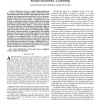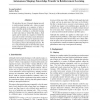458 search results - page 27 / 92 » Q-Decomposition for Reinforcement Learning Agents |
TSMC
2008
13 years 7 months ago
2008
Multiagent systems are rapidly finding applications in a variety of domains, including robotics, distributed control, telecommunications, and economics. The complexity of many task...
ATAL
2008
Springer
13 years 9 months ago
2008
Springer
The problem of coalition formation when agents are uncertain about the types or capabilities of their potential partners is a critical one. In [3] a Bayesian reinforcement learnin...
ACMACE
2006
ACM
14 years 1 months ago
2006
ACM
Massively multiplayer online computer games are played in complex, persistent virtual worlds. Over time, the landscape of these worlds evolves and changes as players create and pe...
ICML
2006
IEEE
14 years 8 months ago
2006
IEEE
We introduce the use of learned shaping rewards in reinforcement learning tasks, where an agent uses prior experience on a sequence of tasks to learn a portable predictor that est...
JMLR
2002
13 years 7 months ago
2002
Lyapunov design methods are used widely in control engineering to design controllers that achieve qualitative objectives, such as stabilizing a system or maintaining a system'...


